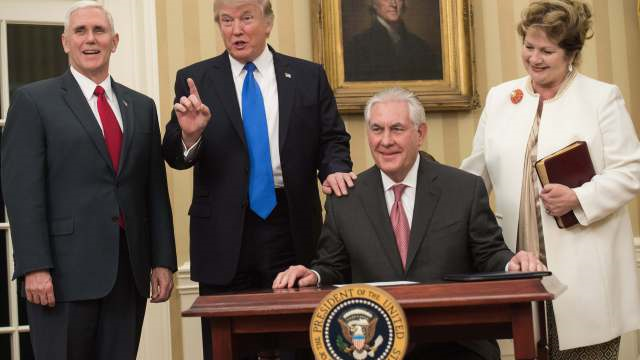A report commissioned by Secretary of State Rex Tillerson and disseminated agencywide recommends that the Department of Homeland Security take over the issuance of U.S. visas, passports and other travel documents as a cost-saving mechanism, according to media reports.
Commissioned earlier this year and authored by private consulting firm Insigniam Holding LLC, the report included input from more than 35,000 employees at State and the U.S. Agency for International Development and was made available to all employees internally, Tillerson said in a Wednesday address to government employees. The report comes on the heels of the White House in May releasing its 2018 budget proposal, which requested an almost 30 percent cut in the budget for the Department of State and the U.S. Agency for International Development.
“There may be an opportunity to elevate efficiency and reduce cost by this change,” the 110-page study said, according to Reuters reports. “Indications are that doing so would elevate security at our borders.”
A separate White House document, reportedly crafted in part by White House policy adviser Stephen Miller, makes a similar proposal, namely, to move State’s Bureau of Consular Affairs and Bureau of Population, Refugees, and Migration over to DHS.
President Trump’s nominee to become the head of consular affairs, Carl Risch, once argued before Congress that visa issuance should be moved to DHS, testifying it is a law-enforcement process and “has nothing to do with diplomacy.”
The idea of transferring the power to issue visas to DHS has been stewing since the inception of DHS in 2002 after the 9/11 attacks. Former President George W. Bush initially proposed giving the DHS secretary broad powers to issue or refuse to issue visas, asserting that visas were critical to national security, but the idea was met with resistance. Instead, Congress adopted a compromise allowing State to maintain its administrative role in issuing visas while abiding by DHS regulations. The Homeland Security Act of 2002 (HSA) section 428 states that DHS
…shall be vested exclusively with all authorities to issue regulations with respect to, administer, and enforce the provisions of such Act, and of all other immigration and nationality laws, relating to the functions of consular officers of the United States in connection with the granting or refusal of visas, and shall have the authority to refuse visas in accordance with law and to develop programs of homeland security training for consular officers (in addition to consular training provided by the Secretary of State), which authorities shall be exercised through the Secretary of State, except that the Secretary shall not have authority to alter or reverse the decision of a consular officer to refuse a visa to an alien….
“Some argue that visa issuance is the real ‘front line’ of homeland security against terrorists and that the principal responsibility should be in DHS, which does not have competing priorities of diplomatic relations and reciprocity with foreign governments,” the Tillerson report states. “Some have expressed the view that [State] retains too much control over visa issuances, maintaining that the Homeland Security Act intended DHS to be the lead department and [State] to merely administer the visa process.”
But it seems to me that the visa function requires balancing the need to facilitate travel and honor diplomatic principles with the law enforcement function of maintaining secure borders. These are functions that a foreign service officer–based on their training and agency culture–may well be better equipped to make than a DHS official.
Tillerson said he would establishing a steering committee to administer reforms over the next three to six months in key areas identified by the report with Deputy Secretary John Sullivan and additional senior officials at the helm. The agency will submit a final report to the Office of Management and Budget on its efforts by Sept. 15.
Moving the visa function from State to DHS would likely require Congressional action.


Leave a Reply